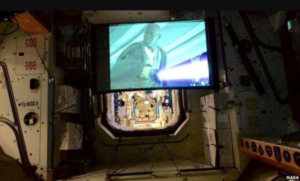- Jan 6, 2017
- 835
NASA is to screen the latest Star Wars movie on the International Space Station.
While audiences around the world will this week begin to see Star Wars: The Last Jedi in cinemas, NASA astronauts aboard the International Space Station (ISS) will also get to watch the movie, officials at NASA have confirmed.
Proving that some movies can literally be an out-of-this-world experience, the astronauts will be given a special ISS-eyes-only edition to watch in their downtime.
Space reporter Robin Seemangal tweeted the news from Earth earlier this week, with a spokesperson for NASA confirming the plans to Inverse. “… can confirm the crew will be able to watch it on orbit,” NASA Public Affairs Officer Dan Huot said. “[While there is no] definitive time-line yet, they typically get movies as digital files and can play them back on a laptop or a standard projector that is currently aboard.”

NASA to screen ‘Star Wars: The Last Jedi’ on the International Space Station.
Space, man
This is good news for the astronauts, and rumors have abounded that they shouldn’t have to wait too long to get their hands on the film, with many speculating, a copy of the Last Jedi will be delivered while the movie is still on general release in theaters.

Once, as a punishment, astronauts were forced to watch the prequel films.
Astronauts typically have a large digital section of movies and TV shows on hand to watch in the little downtime they have while working on the ISS.
Unsurprisingly, many of the available films are space themed, and include previous Star Wars films, the Alien franchise, and other sci-fi classics such as 2001: A Space Oydessy.
The astronauts however will be forced to watch the film in somewhat not ideal settings. Despite the vastness of space, space on the ISS is at a premium, and communal movie watching represents problems. Even when using projectors, the viewing screen is still quite small.
At the time of writing it had not been confirmed if the Last Jedi would be beamed to the ISS or if a physical hard copy would be delivered on the next DragonX resupply module.
While audiences around the world will this week begin to see Star Wars: The Last Jedi in cinemas, NASA astronauts aboard the International Space Station (ISS) will also get to watch the movie, officials at NASA have confirmed.
Proving that some movies can literally be an out-of-this-world experience, the astronauts will be given a special ISS-eyes-only edition to watch in their downtime.
Space reporter Robin Seemangal tweeted the news from Earth earlier this week, with a spokesperson for NASA confirming the plans to Inverse. “… can confirm the crew will be able to watch it on orbit,” NASA Public Affairs Officer Dan Huot said. “[While there is no] definitive time-line yet, they typically get movies as digital files and can play them back on a laptop or a standard projector that is currently aboard.”

NASA to screen ‘Star Wars: The Last Jedi’ on the International Space Station.
Space, man
This is good news for the astronauts, and rumors have abounded that they shouldn’t have to wait too long to get their hands on the film, with many speculating, a copy of the Last Jedi will be delivered while the movie is still on general release in theaters.

Once, as a punishment, astronauts were forced to watch the prequel films.
Astronauts typically have a large digital section of movies and TV shows on hand to watch in the little downtime they have while working on the ISS.
Unsurprisingly, many of the available films are space themed, and include previous Star Wars films, the Alien franchise, and other sci-fi classics such as 2001: A Space Oydessy.
The astronauts however will be forced to watch the film in somewhat not ideal settings. Despite the vastness of space, space on the ISS is at a premium, and communal movie watching represents problems. Even when using projectors, the viewing screen is still quite small.
At the time of writing it had not been confirmed if the Last Jedi would be beamed to the ISS or if a physical hard copy would be delivered on the next DragonX resupply module.

